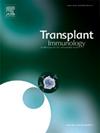Regulatory B cells: Synergistic cellular mechanisms and therapeutic potential for alleviating transplant rejection
IF 1.4
4区 医学
Q4 IMMUNOLOGY
引用次数: 0
Abstract
Posttransplantation rejection remains a critical challenge in organ transplantation. While immunosuppressants improve graft survival, their long-term side effects compromise patient quality of life, necessitating novel, side effect-free strategies to reduce the incidence of rejection. Regulatory B cells (Bregs), an immunomodulatory B lymphocyte subset within the immune microenvironment, have the potential to mitigate transplant rejection. However, Bregs alone are insufficient to control rejection, and their suppressive effects are notably limited in the absence of immunosuppression, highlighting their dependence on synergistic interactions with other regulatory mechanisms. This review summarizes the diverse phenotypes of Bregs and elucidates their immunomodulatory mechanisms, with a focus on cellular interactions (e.g., with Tregs, macrophages, dendritic cells, and NK cells) and cytokine secretion (e.g., IL-10, TGF-β, and IL-35). We critically evaluate animal and clinical trial data concerning the role of Bregs in transplantation, discussing their potential as therapeutic targets and the current limitations and future directions for harnessing Bregs to alleviate transplant rejection.
调节性B细胞:减轻移植排斥反应的协同细胞机制和治疗潜力
移植后排斥反应仍然是器官移植的一个重要挑战。虽然免疫抑制剂可以提高移植物的存活率,但其长期副作用会影响患者的生活质量,因此需要新的无副作用的策略来减少排斥反应的发生率。调节性B细胞(Bregs)是免疫微环境中的一种免疫调节B淋巴细胞亚群,具有减轻移植排斥反应的潜力。然而,单独的Bregs不足以控制排斥反应,并且在缺乏免疫抑制的情况下,它们的抑制作用明显有限,突出了它们依赖于与其他调节机制的协同相互作用。本文综述了Bregs的多种表型,并阐明了它们的免疫调节机制,重点关注细胞相互作用(如与Tregs、巨噬细胞、树突状细胞和NK细胞)和细胞因子分泌(如IL-10、TGF-β和IL-35)。我们批判性地评估了关于Bregs在移植中的作用的动物和临床试验数据,讨论了它们作为治疗靶点的潜力,以及利用Bregs缓解移植排斥反应的当前局限性和未来方向。
本文章由计算机程序翻译,如有差异,请以英文原文为准。
求助全文
约1分钟内获得全文
求助全文
来源期刊

Transplant immunology
医学-免疫学
CiteScore
2.10
自引率
13.30%
发文量
198
审稿时长
48 days
期刊介绍:
Transplant Immunology will publish up-to-date information on all aspects of the broad field it encompasses. The journal will be directed at (basic) scientists, tissue typers, transplant physicians and surgeons, and research and data on all immunological aspects of organ-, tissue- and (haematopoietic) stem cell transplantation are of potential interest to the readers of Transplant Immunology. Original papers, Review articles and Hypotheses will be considered for publication and submitted manuscripts will be rapidly peer-reviewed and published. They will be judged on the basis of scientific merit, originality, timeliness and quality.
 求助内容:
求助内容: 应助结果提醒方式:
应助结果提醒方式:


